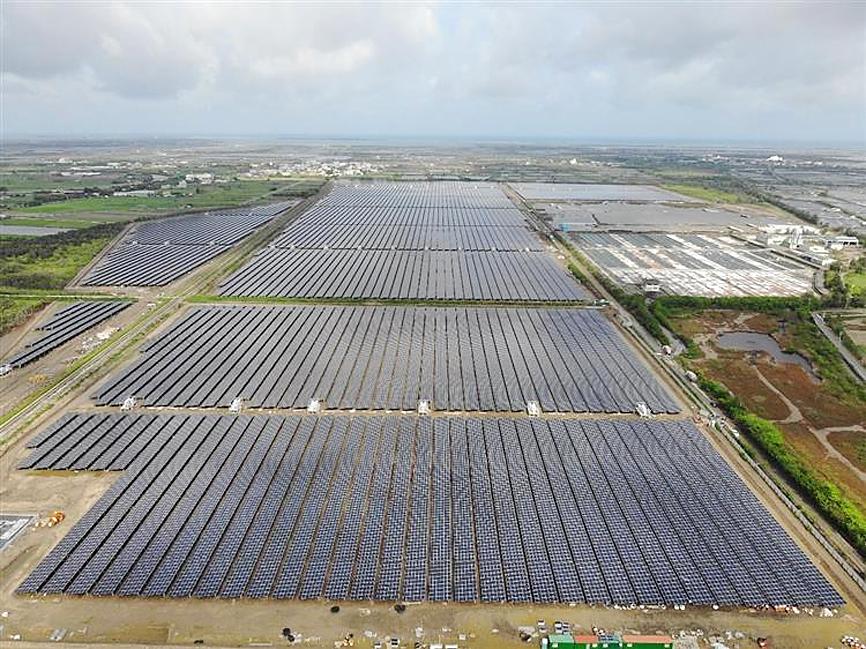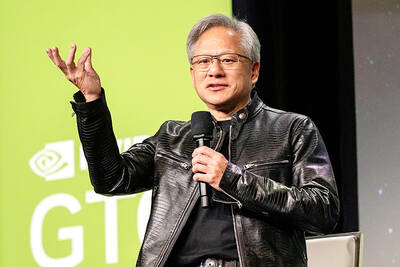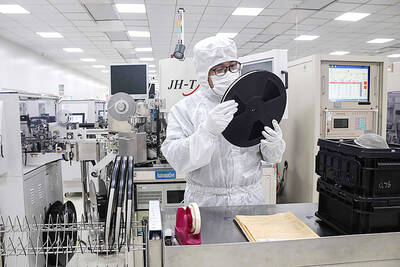Taiwan’s largest ground-level solar farm, a 181-megawatt (MW) project in Tainan’s Cigu District (七股), joined the nation’s electricity grid at the end of last month, state-run Taiwan Sugar Co (Taisugar, 台糖) said yesterday.
By the end of the year, the company plans to expand the project to provide up to 216MW of electricity, the equivalent of 300 million kilowatt hours per year, or the equivalent of the annual electricity consumption of 83,000 homes, Taisugar said in a press release.
The Cigu solar project sits on 189 hectares of land deemed “not suitable for cultivation” by Taisugar, it said.

Photo courtesy of Taiwan Sugar Co
After a bidding process in 2019, the tender for the project went to Chung-hsin Electric and Machinery Manufacturing Corp (中興電工).
It is the first — but not the last — Taisugar green power project built on land not suitable for farming, it said.
“We hope to repeat the formula for other suitable parcels [of land] owned by Taisugar,” it said, without elaborating.
Taiwan’s sugarcane trade once flourished and sugar was a major export. Taisugar, established in 1946 by the government, has diversified into various businesses, including a chain of convenience stores, hog farming, floriculture and biotechnology, as the cost structure of domestic sugar production waned in the past few decades.
Turning agricultural land into solar farms has been controversial in Taiwan, with some arguing that it needs to be preserved for food security reasons.
However, the Cigu lot was not under cultivation and could not be brought under cultivation, easing its transition into a solar farm, Taisugar said.
“The land used in the solar project suffered from subsidence and salt contamination, and struggled to support sugar cane, as well as other crops,” Taisugar said.

‘DECENT RESULTS’: The company said it is confident thanks to an improving world economy and uptakes in new wireless and AI technologies, despite US uncertainty Pegatron Corp (和碩) yesterday said it plans to build a new server manufacturing factory in the US this year to address US President Donald Trump’s new tariff policy. That would be the second server production base for Pegatron in addition to the existing facilities in Taoyuan, the iPhone assembler said. Servers are one of the new businesses Pegatron has explored in recent years to develop a more balanced product lineup. “We aim to provide our services from a location in the vicinity of our customers,” Pegatron president and chief executive officer Gary Cheng (鄭光治) told an online earnings conference yesterday. “We

It was late morning and steam was rising from water tanks atop the colorful, but opaque-windowed, “soapland” sex parlors in a historic Tokyo red-light district. Walking through the narrow streets, camera in hand, was Beniko — a former sex worker who is trying to capture the spirit of the area once known as Yoshiwara through photography. “People often talk about this neighborhood having a ‘bad history,’” said Beniko, who goes by her nickname. “But the truth is that through the years people have lived here, made a life here, sometimes struggled to survive. I want to share that reality.” In its mid-17th to

‘MAKE OR BREAK’: Nvidia shares remain down more than 9 percent, but investors are hoping CEO Jensen Huang’s speech can stave off fears that the sales boom is peaking Shares in Nvidia Corp’s Taiwanese suppliers mostly closed higher yesterday on hopes that the US artificial intelligence (AI) chip designer would showcase next-generation technologies at its annual AI conference slated to open later in the day. The GPU Technology Conference (GTC) in California is to feature developers, engineers, researchers, inventors and information technology professionals, and would focus on AI, computer graphics, data science, machine learning and autonomous machines. The event comes at a make-or-break moment for the firm, as it heads into the next few quarters, with Nvidia CEO Jensen Huang’s (黃仁勳) keynote speech today seen as having the ability to

The battle for artificial intelligence supremacy hinges on microchips, but the semiconductor sector that produces them has a dirty secret: It is a major source of chemicals linked to cancer and other health problems. Global chip sales surged more than 19 percent to about US$628 billion last year, according to the Semiconductor Industry Association, which forecasts double-digit growth again this year. That is adding urgency to reducing the effects of “forever chemicals” — which are also used to make firefighting foam, nonstick pans, raincoats and other everyday items — as are regulators in the US and Europe who are beginning to